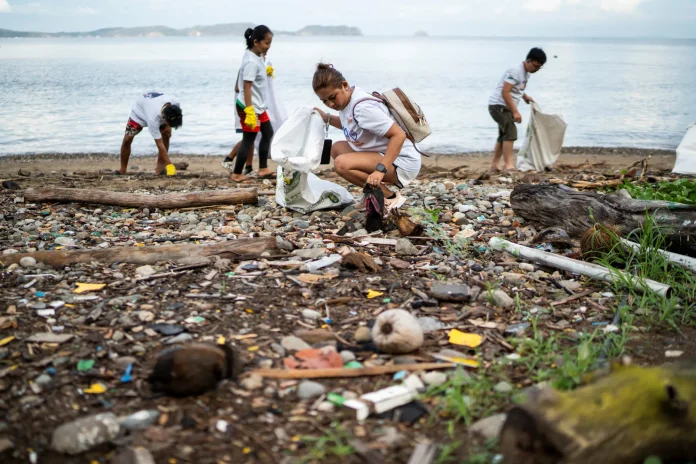A growing number of nations in Southeast Asia are imposing rules that hold producers responsible for the blight of plastic pollution.
The world produces a staggering 400 million tonnes of plastic each year, and an estimated 20 million tonnes wind up in the environment.
Making plastic, which requires fossil-fuel-based chemicals, is responsible for about 3% of global emissions. After a water bottle or shopping bag is discarded, it can break down into microplastics in the ocean, choking aquatic life.
More than a third of ocean plastic comes from the Philippines, according to a 2021 paper in Science Advances. Much of that plastic flows into the sea from Philippine rivers.
The Philippines and Vietnam have adopted extended producer responsibility, or EPR, policies that compel businesses to minimise the environmental impact of their plastic products.
Governments will decide in November on the final terms of a global treaty to end plastic pollution at a meeting convened by the United Nations.
Can EPR policies help rid the world of plastic pollution?
What is extended producer responsibility?
EPR policies are designed to encourage plastic manufacturers to design products with minimal plastic use, ensure effective waste collection and improve the rates of reuse and recycling of plastics.
These rules hold plastic packaging producers and brands financially liable for the collection, recovery and recycling of their products through fees, taxes or fines.
That gives governments a revenue stream to pay for the collection and treatment of plastic waste, which requires significant investment in infrastructure, with developing countries often facing higher costs as a share of gross domestic product.
Philippine law requires a materials recovery facility in every village to promote recycling, but only about 40% of districts have access to these facilities, according to a 2022 report by U.N. Habitat.
Which countries have EPR laws?
Well-established EPR models are found across most of the European Union and parts of the United States, as well as India, Japan, South Korea, Chile and Colombia.
In 2022, the Philippines passed the EPR Act – its strongest legislation to date to hold businesses accountable for plastic pollution, with fines of up to 10 million pesos ($172,000) for failing to establish or phase-in programmes and register such programmes with the national solid waste management council.
Companies are now obliged to reduce the production, import, supply or use of plastic packaging deemed low in reusability, recyclability or retrievability and ultimately achieve plastic neutrality through efficient recovery and diversion schemes.
The law requires businesses in the island nation to divert 40% of their annual plastic packaging footprint away from landfills to recycling or repurposing facilities by 2024, then increase that rate by 10% annually to 80% by 2028.
Indonesia and Vietnam have also enacted EPR regulations, in which plastic producers must work with a “producer responsibility organisation” to meet legal obligations for recycling and waste management.
Are EPR policies effective?
Policies including EPR can reduce the volume of plastics entering oceans by more than 80%, cut greenhouse gas emissions by 25% and save countries $70 billion by 2040, according to a 2023 report by the U.N. Environment Programme.
EPR schemes help support the expansion of efficient collection and sorting systems for plastic waste, according to a report by the Organisation for Economic Cooperation and Development (OECD).
During the first year of the Philippines’ EPR law, the country was able to divert 163 million kg away from landfills, out of 486 million kg of total audited and reported plastic packaging in 2023.
This volume of waste spared landfills the equivalent of $14.5 million in the plastic credit market, in which companies can buy and sell credits to offset their plastic footprint, or how much plastic a company produces each year.
However, plastic waste collection and recycling rates can remain a problem, even when EPR policies are in place.
Only 15% of global plastic waste is collected for recycling, with less than 9% of waste being recycled, according to the OECD global plastics database.
How does EPR affect informal waste workers?
About 20 million people in the world are engaged in informal waste work, including collecting or sorting plastic waste from households and businesses. These workers account for roughly 60% of plastic collected globally, according to The Circulate Initiative, a global NGO.
Informal waste workers are often women, children and the elderly forced into this work due to a lack of other opportunities. They are exposed to harmful chemicals and other health risks on the job.
Backers of EPR policies believe integrating the informal waste sector in the scheme can help boost plastic waste collection and recycling rates.
Firms that support governments in implementing EPR, such as the Plastic Credit Exchange in the Philippines, have introduced private-sector funded programmes where waste workers can exchange collected plastics for cash in their communities.
But some groups who advocate for informal workers, like the Global Alliance for Incinerator Initiatives and the International Alliance of Waste Pickers, say informal waste workers need greater support, such as proper compensation and a healthier working environment.
This may include a legal recognition of informal worker rights in local policies, facilitating their access to social security and assisting the creation of waste workers’ businesses, cooperatives or unions, according to a report by the C40 Cities advocacy organization.









